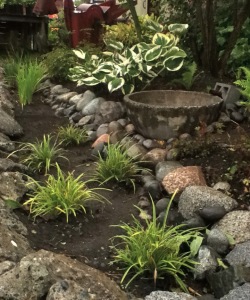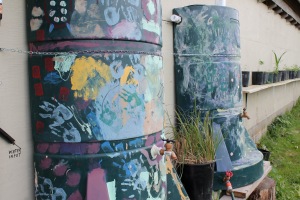Rainwater Harvesting Program
The aim of the Rainwater Harvest program is to build water consciousness in our community and engage residents to take personal responsibility for helping to ensure sustainable water supplies. The program is designed to demonstrate landscape techniques that will aide in the collection, conservation and re-use of rainwater in residential settings. The program will help homeowners to protect and conserve our water resources, through such strategies as increasing areas of vegetation, the use of native plants, and the installation of rain gardens to capture rainwater and increase groundwater recharge.
 As a way of engaging the larger community, Earthwise Society is partnering with the local arts and educational communities in Delta to host a yearly family friendly “Rain Day” event that explores creative ways to communicate environmental messages through art.
As a way of engaging the larger community, Earthwise Society is partnering with the local arts and educational communities in Delta to host a yearly family friendly “Rain Day” event that explores creative ways to communicate environmental messages through art.
Earthwise would like to thank the project funders EcoAction, Vancity and TD.
Importance of Rainwater Harvesting
Earthwise Society recently participated in a study through BC Climate Action Initiative to assess potential impacts of climate change on agriculture in our community. Climate change is expected to increase both summer drought and winter rain, and intensify winter storms and lowland flooding. These changes will adversely impact all of us – not only agriculture – and we all need to be actively involved in exploring solutions.
In spite of concerns about climate change, as a population, we are not keenly water aware. Over the last 20 years, during a period of growing global concern about the sustainability of fresh water supplies, water use in Canada increased by 25% (Vancouver Sun, Mar. 2008). The Rain Harvest project aims to get people thinking about the value and fragility of our fresh water supplies and taking action to protect it.
The Lower Mainland’s wet winter, dry summer climate poses unique challenges in managing water resources. During the winter more rain falls than we can store in reservoirs or handle through storm drains. Runoff from roads, roofs and parking lots carries contaminants into salmon bearing waterways and low lying areas. The Rain Harvest project will raise awareness about water cycles and climate change and show residents how they can help by conserving, collecting and re-using water. A single rain garden has the potential to soak up thousands of gallons of polluted runoff to protect our waterways and help us better meet our landscape water requirements during the summer months. These actions benefit all of our communities and the agricultural and fisheries sectors that depend on sustainable supplies of clean water.
To gain a better understanding of the extent of interest in, and awareness of, Rain Gardens in our community, we would appreciate your taking part in this brief survey. Your participation will be very valuable to our program development at Earthwise.





